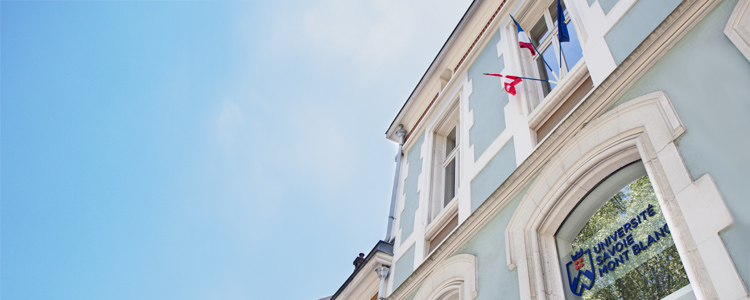See the portraits of the presidential team in pictures
Chairman
- Philippe GALEZ
Vice-presidents
- Philippe BRIAND: Vice-Chairman of the Board of Directors, in charge of human resources, personnel, gender equality, information systems and general and legal affairs. He is also First Vice-President of the University.
- Jean François JOYE: Vice-Chairman of the Board of Directors, in charge of finance, quality, contractual policy and management.
- Mareva SABATIER : Vice-president in charge of research
- Jean-François DREUILLE: Vice-President in charge of academics and university life
- Bernard CARON: Vice-President in charge of the transformation of undergraduate education, reporting to the Vice-President academics
- David MÉLO: Vice-Chairman in charge of guidance, relations with high schools and professional integration, reporting to the Vice-Chairman academics. He is also vice-president in charge of communications
- Eric WEISS: Vice-President in charge of work-study programs
- Cristina VIGNALI de POLI: Vice-President in charge of campus life, culture, scientific, technical and industrial culture, and anti-discrimination initiatives, reporting to the Vice-President academics and the Vice-President forResearch.
- Claire SALMON, vice-president in charge of interdisciplinarity and links academics-research
- Nicolas FORESTIER: Vice-President in charge of business development and contractual relations with companies, reporting to the Vice-President for Research
- Laurence VIGNOLLET: Vice-President, International Relations
- Gilles FRAISSE: Vice-President, Heritage and Environmental Transition
- PatriceMELE: Vice-Chairman in charge of digital and information systems, reporting to the Vice-Chairman of the Board of Directors in charge of human resources, personnel, gender equality, information systems and general and legal affairs.
- Nicolas MOURGUES: Student vice-president
Project managers
- Ilham ALLOUI: PIX project manager
- Pascale BALLAND: Scientific and technical culture officer
- Arnaud CARRÉ: Wellness/Health
- Nirina CHHAY: UNITA project manager
- Jean-Jacques CURTELIN: Hybridisation-Moodle-Karuta project manager
- Véronique FAVRE-BONTÉ: InnoUNITA referent
- Paul JONES, Head of Language Certification & Additional Modern Languages.
- Ekaterina LE PENNEC: Entrepreneurship Officer
- Aurore MIONNET: in charge of the Teaching professions mission
- Lionel VALET, Campus Connections Project Manager
- Laurence VIGNOLLET, Head of FLE and Francophonie Department
Office
The Board of Directors adopted the list of twelve members who will make up the university's executive committee:
- the chairman
- Vice-Chairman of the Board of Directors, First Vice-Chairman
- Vice-Chairman of the Board of Directors
- the Vice-Chairman academics
- vice-president research
- the seven directors of UFRs, Schools and Institutes
Referrers, relays and experts
- David BAILLEUL: Ethics referent
- Christelle BONATO: Homophobia referent
- Christelle BONATO: Integrity referent
- Christelle BONATO: Secularism referent
- Christelle BONATO: Radicalization prevention referent
- Christelle BONATO: Racism and anti-Semitism referent
- Christelle BONATO: Transgender referent
- Eric BRUNAT: Territory referent
- Jean-Baptiste EVROT: High-level sportsmen and women (SHN) referent
- Rachel GONCALVES: Civic Service referent
- Thierry ROLANDO: Campus des métiers et des qualifications referent
- Mareva SABATIER: Scientific ethics referent
- Frédéric TURPIN: Chaire Senghor de la Francophonie referent
- Frédéric TURPIN: Defense and Security representative
- Grégory CHATEL: Circular Economy referent
- Stéphane BAUZAC: Telephony expert
- Christelle BONATO: Defense Security Officer
- Sorana CIMPAN: Hype-13 expert
- Christophe HARBINE: Information System Security Manager
- Noémie HENRY: responsible for access to administrative documents - Data protection
- Lionel VALET: Pedagogical innovation expert
